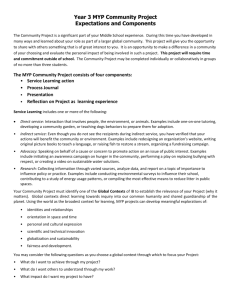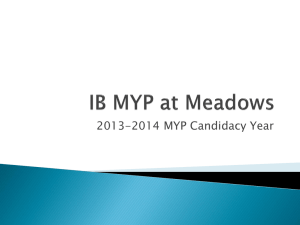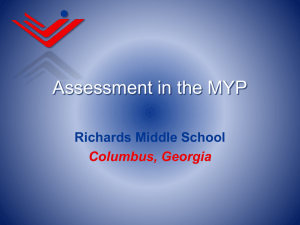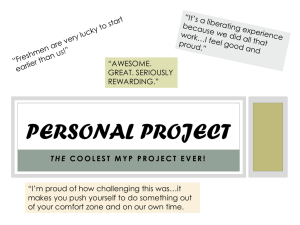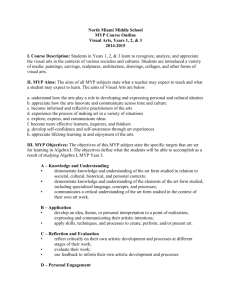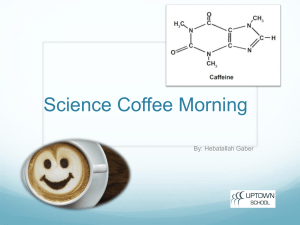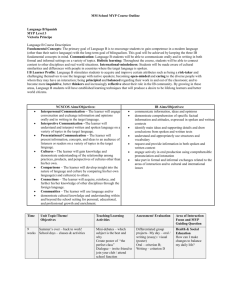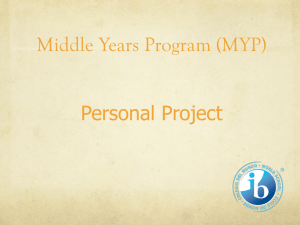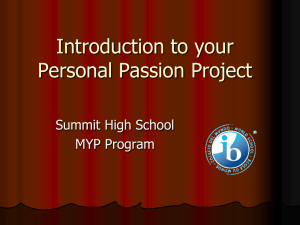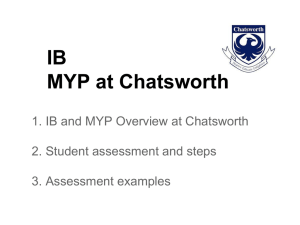Personal Project Process Journal for 10th graders (2015
advertisement
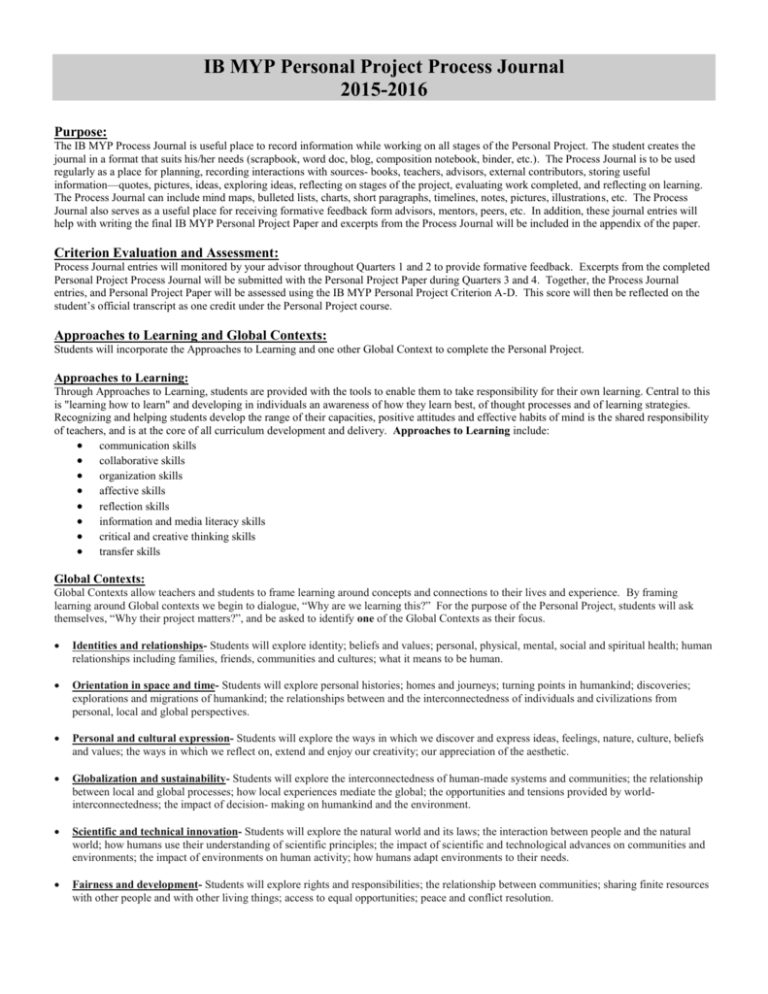
IB MYP Personal Project Process Journal 2015-2016 Purpose: The IB MYP Process Journal is useful place to record information while working on all stages of the Personal Project. The student creates the journal in a format that suits his/her needs (scrapbook, word doc, blog, composition notebook, binder, etc.). The Process Journal is to be used regularly as a place for planning, recording interactions with sources- books, teachers, advisors, external contributors, storing useful information—quotes, pictures, ideas, exploring ideas, reflecting on stages of the project, evaluating work completed, and reflecting on learning. The Process Journal can include mind maps, bulleted lists, charts, short paragraphs, timelines, notes, pictures, illustrations, etc. The Process Journal also serves as a useful place for receiving formative feedback form advisors, mentors, peers, etc. In addition, these journal entries will help with writing the final IB MYP Personal Project Paper and excerpts from the Process Journal will be included in the appendix of the paper. Criterion Evaluation and Assessment: Process Journal entries will monitored by your advisor throughout Quarters 1 and 2 to provide formative feedback. Excerpts from the completed Personal Project Process Journal will be submitted with the Personal Project Paper during Quarters 3 and 4. Together, the Process Journal entries, and Personal Project Paper will be assessed using the IB MYP Personal Project Criterion A-D. This score will then be reflected on the student’s official transcript as one credit under the Personal Project course. Approaches to Learning and Global Contexts: Students will incorporate the Approaches to Learning and one other Global Context to complete the Personal Project. Approaches to Learning: Through Approaches to Learning, students are provided with the tools to enable them to take responsibility for their own learning. Central to this is "learning how to learn" and developing in individuals an awareness of how they learn best, of thought processes and of learning strategies. Recognizing and helping students develop the range of their capacities, positive attitudes and effective habits of mind is the shared responsibility of teachers, and is at the core of all curriculum development and delivery. Approaches to Learning include: communication skills collaborative skills organization skills affective skills reflection skills information and media literacy skills critical and creative thinking skills transfer skills Global Contexts: Global Contexts allow teachers and students to frame learning around concepts and connections to their lives and experience. By framing learning around Global contexts we begin to dialogue, “Why are we learning this?” For the purpose of the Personal Project, students will ask themselves, “Why their project matters?”, and be asked to identify one of the Global Contexts as their focus. Identities and relationships- Students will explore identity; beliefs and values; personal, physical, mental, social and spiritual health; human relationships including families, friends, communities and cultures; what it means to be human. Orientation in space and time- Students will explore personal histories; homes and journeys; turning points in humankind; discoveries; explorations and migrations of humankind; the relationships between and the interconnectedness of individuals and civilizations from personal, local and global perspectives. Personal and cultural expression- Students will explore the ways in which we discover and express ideas, feelings, nature, culture, beliefs and values; the ways in which we reflect on, extend and enjoy our creativity; our appreciation of the aesthetic. Globalization and sustainability- Students will explore the interconnectedness of human-made systems and communities; the relationship between local and global processes; how local experiences mediate the global; the opportunities and tensions provided by worldinterconnectedness; the impact of decision- making on humankind and the environment. Scientific and technical innovation- Students will explore the natural world and its laws; the interaction between people and the natural world; how humans use their understanding of scientific principles; the impact of scientific and technological advances on communities and environments; the impact of environments on human activity; how humans adapt environments to their needs. Fairness and development- Students will explore rights and responsibilities; the relationship between communities; sharing finite resources with other people and with other living things; access to equal opportunities; peace and conflict resolution. Process Journal Prompt Ideas: Listed below are Process Journal prompt ideas. Students are not limited to only respond to these prompts and do not have to respond to all of the prompts. Students will include additional reflections, questions, ideas, sketches, photos, lists, graphic organizers, etc. while working on the project. These responses will be helpful to reference later while writing the MYP Personal Project Paper and to include in the appendix of the paper. How do I plan to set up my journal (scrapbook, word doc, blog, composition notebook, binder, etc.)? Will I use lists, photos, diagrams, sketches, graphic organizers, etc. (any and all are acceptable and encouraged)? What is the purpose of my project? In other words, what do I want others to understand through my work and/or what impact do I want my project to have? What do I hope to achieve through my Personal Project, and how will it challenge me? How is one of the Global Contexts visible in my project? How can the chosen Global Context enrich my Personal Project? What is my plan of action for my Project? Please also include a time-line. How will I measure the success of my final product? List specifics for how I will evaluate the final Personal Project outcome or product. Who are some adults and peers and mentors that can assist me in both organizing the project and specializing in the project? When and how will I meet with the adults/peers who can assist me? How will I communicate any issues or progress in my Personal Project with my adults/mentors (keep record of this in journal)? What are the materials that I already have? What are the materials I need? How will I select and organize my research? What specific sources are relevant to my topic? What sources do I need to make my project successful? (interviews, books, web databases, magazines, encyclopedias, reference books, multi-media presentations, workshops, articles, newspapers, museums, libraries, and other site visits) List at least 5 sources (include biographical information and annotation/summary). How do I know if these sources are reliable/credible? How will I evaluate my sources? Are there any additional resources that I need to create (carry out experiments, create surveys, arrange interviews. etc)? Overall, how is the development of my Personal Project so far? What challenges am I encountering in the Personal Project? What solutions can I create to these challenges? What are my next steps towards creating a successful Personal Project? As I reflect on my Personal Project, how has this guided my work? How can I continue (using resources and knowledge gained) to make informed decisions in connection with the project’s goal? Provide examples. Currently, do I have a variety of sources? If not, what do I need to add/find? What additional sources will enhance my project or to help me learn something new about my topic? How has the knowledge from my research/sources influenced or changed my Personal Project? How will my audience see or hear my sources in my project? How visible is my chosen Global Context in my project? If it is not clearly visible, what changes can I make? What is going well with my project? What are the challenges and how will I overcome these challenges? Is my project matching my goal at this point? How has it transformed? What changes would I like to make now that I have started my project? What do I need to do to finish my project (time frames, uncompleted tasks, unanswered questions, additional contacts for resources and research)? What questions do I have about writing the paper? How has reflecting on this project extended my knowledge and understanding of the topic? How have I developed as a learner by completing the project? How would I like to present my project to others during the showcase? Reflecting on my project, how would I assess myself on MYP Personal Project Criteria Rubric? Why? * include additional reflections, questions, ideas, sketches, photos, lists, graphic organizers, etc. while working on the project during this time *PLEASE BRING YOUR JOURNALS EVERYTIME YOU MEET WITH YOUR ADVISOR* IB MYP Personal Project Criteria Rubric: IB HP Criterion A Criterion B Level Grade Investigating Planning The student does not achieve The student does not achieve 0 N a standard described by any (55%) a standard described by any 1-2 D (65%) of the descriptors below. of the descriptors below. state a goal and context for the project, based on personal interests, but this may be limited in depth or accessibility identify prior learning and subject-specific knowledge, but this may be limited in occurrence or relevance demonstrate limited research skills. outline a basic and appropriate goal and context for the project, based on personal interests identify basic prior learning and subjectspecific knowledge relevant to some areas of the project demonstrate adequate research skills. define a clear and challenging goal and context for the project, based on personal interests identify prior learning and subject-specific knowledge generally relevant to the project demonstrate substantial research skills. define a clear and highly challenging goal and context for the project, based on personal interests identify prior learning and subject-specific knowledge that is consistently highly relevant to the project demonstrate excellent research skills. 3-4 C (75%) 5-6 B (85%) 7-8 A (95%) develop limited criteria for the product/outcome present a limited or partial plan and record of the development process of the project demonstrate limited selfmanagement skills. develop adequate criteria for the product/outcome present an adequate plan and record of the development process of the project demonstrate adequate self-management skills. develop substantial and appropriate criteria for the product/outcome present a substantial plan and record of the development process of the project demonstrate substantial self-management skills. develop rigorous criteria for the product/outcome present a detailed and accurate plan and record of the development process of the project demonstrate excellent self-management skills. Criterion C Taking Action Criterion D Reflecting The student does not achieve a standard described by any of the descriptors below. create a limited product/outcome in response to the goal, global context and criteria demonstrate limited thinking skills demonstrate limited communication and social skills. The student does not achieve a standard described by any of the descriptors below. create a basic product/outcome in response to the goal, global context and criteria demonstrate adequate thinking skills demonstrate adequate communication and social skills. create a substantial product/outcome in response to the goal, global context and criteria demonstrate substantial thinking skills demonstrate substantial communication and social skills. create an excellent product/outcome in response to the goal, global context and criteria demonstrate excellent thinking skills demonstrate excellent communication and social skills. present a limited evaluation of the quality of the product/outcome against his or her criteria present limited reflection on how completing the project has extended his or her knowledge and understanding of the topic and the global context present limited reflection on his or her development as an IB learner through the project. present a basic evaluation of the quality of the product/outcome against his/her criteria present adequate reflection on how completing the project has extended his/her knowledge and understanding of the topic and the global context present adequate reflection on his/her development as an IB learner through the project. present a substantial evaluation of the quality of the product/outcome against his/her criteria present substantial reflection on how completing the project has extended his/her knowledge and understanding of the topic and the global context present substantial reflection on his/her development as an IB learner through the project. present an excellent evaluation of the quality of the product/outcome against his/her criteria present excellent reflection on how completing the project has extended his/her knowledge and understanding of the topic and the global context present excellent reflection on his/her development as an IB learner through the project. *The Personal Project Paper receives a pass/no pass credit, which follows achievement levels on a rubric rather than percentage for grading purposes. Achievement Level Ranges: 25-32 = A (Pass) 17-24 = B (Pass) 9-16 = C (Pass) 4-8 = D (Pass) 0-3 = NP (No Pass) Last Updated: September 10, 2015
